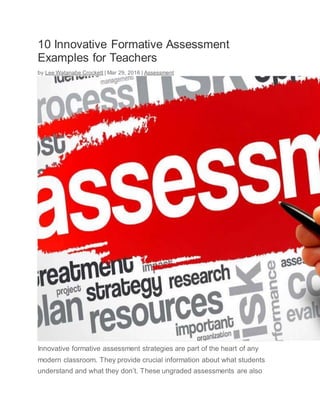
10 Innovative Formative Assessment Examples for Teachers
- 1. 10 Innovative Formative Assessment Examples for Teachers by Lee Watanabe Crockett | Mar 29, 2016 | Assessment Innovative formative assessment strategies are part of the heart of any modern classroom. They provide crucial information about what students understand and what they don’t. These ungraded assessments are also
- 2. valuable guides for students. It can help them enhance their performance. Teachers can use them to determine if further instruction is necessary. Using innovative formative assessment consistently and effectively removes the surprises from getting final grades. When integrated into teaching and learning on an ongoing basis, students can constantly improve and excel. Formative assessment is “assessment as learning”. In other words, the feedback is used to improve the learning. One important tip from our upcoming book Mindful Assessment, is that when a number is provided, the learning stops. With this in mind think of formative as not identifying what was done well or correctly, but on what opportunities there are to improve. Innovative Formative Assessment: 10 Useful Approaches Formative assessment is assessment for learning and as learning. This continual cycle of feedback and improvement makes learning useful and effective. What follows are 10 innovative formative assessment strategies for teachers to try out. 1. Analyzing Student Work A great deal of information can be learned from students’ homework, tests, and quizzes. This is especially so if the students are required to explain their thinking. When teachers take the time to analyze student work, they gain knowledge about: A student’s current knowledge, attitudes, and skills about subject matter Strengths, weaknesses, and learning styles Need for further, or special, assistance This approach lets teachers modify their instruction to be more effective in the future.
- 3. 2. Round Robin Charts This strategy involves passing charts among groups to assess understanding. Each group of 4 or 5 students begins with a chart and some markers. The group records an answer to an open-ended question. They can also share knowledge they have on a topic covered in class. Once the students finish with the chart, they pass it on to the next group. Once every group has worked on every chart, responses are discussed as a class. 3. Strategic Questioning Questioning strategies may be used with individuals, small groups, or the entire class. Effective formative assessment strategies involve asking students to answer higher-order questions such as “why” and “how.” Higher- order questions require more in-depth thinking from the students. They can help the teacher discern the level and extent of the students’ understanding.
- 4. 4. 3-Way Summaries The idea here is to use different modes of thinking and attention to detail. Students can work in groups or individually. In response to a question or topic inquiry, they write three different summaries: 10–15 words long 30–50 words long 75–100 words long You can even have students use Twitter. Chances are you’ve got a lot of students who use it already. They’ll have experience communicating messages with minimal wording and characters. 5. Think-Pair-Share This is one of the many formative assessment strategies that is simple for teachers to use. The instructor asks a question, and students write down their answers. Students are then placed in pairs to discuss their responses. Teachers are able to move around the classroom and listen to various discussions. It lets them gain valuable insight into levels of understanding. 6. 3–2–1 Countdown
- 5. This is a true test of relevant and meaningful learning. When students learn something they find useful, they’re likely to want to use that learning in some way. Have students end the day with this one. Give them cards to write on, or they can respond orally. They are required to respond to three separate statements: 3 things you didn’t know before 2 things that surprised you about this topic 1 thing you want to start doing with what you’ve learned You can also ask them different kinds of questions. These are suggestions, so feel free to make up your own. 7. Classroom Polls Polls let students give responses quickly and accurately. A silent poll is perfect for those “shy” students who have trouble speaking up. These are also a quick way to check understanding using mobile technology. Try tools like Poll Everywhere or SurveyPlanet. 8. Exit/Admit Tickets A simple but effective formative assessment is the exit ticket. Exit tickets are small pieces of paper or cards that students deposit as they leave the classroom. Students write down an accurate interpretation of the main idea
- 6. behind the lesson taught that day. Next, they provide more detail about the topic. Admit tickets are done at the very beginning of the class. Students may respond to questions about homework, or on the lesson taught the day before. 9. One-Minute Papers One-minute papers are usually done at the end of the day. Students can work individually or in groups here. They must answer a brief question in writing. Typical questions posed by teachers center around: Main point Most surprising concept Questions not answered Most confusing area of topic What question from the topic might appear on the next test Without formative assessments, the first indication that a student doesn’t grasp the material is when they fail a quiz or a test. An innovative formative assessment strategy like this can take failure out of the classroom. 10. Creative Extension Projects Students can create a large scope of projects to demonstrate comprehension. Quick projects help them apply the higher-order levels of Bloom’s Taxonomy. These don’t have to be big and complicated. They can take a day, a half-day, or even an hour. Here are some extension ideas for quick projects: Create a poster or collage illustrating the subject matter Record a rehearsed skit or podcast discussing the topics covered Build a diorama about the subject and create a narrative behind it Let students design their own flashcards to test each other with Keynote presentations made by students on the topic